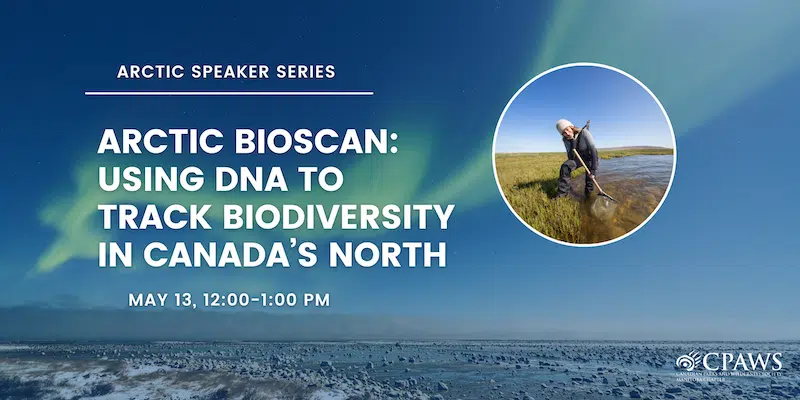
Arctic Bioscan: Using DNA to Track Biodiversity in Canada’s North
Join us for a CPAWS Manitoba webinar with researcher Dani Nowosad, whose work uses DNA barcoding to measure biodiversity in Canada’s North.
The Arctic is warming at three times the average global rate, causing sea ice to melt more quickly and affecting many plant and animal species in the region.
It’s important for researchers to understand these changes to Arctic environments as they can have severe consequences globally—including rising sea levels and unpredictable fluctuations in methane and carbon cycling. But there is currently not enough baseline data on biodiversity to track the effects of these changing climate conditions.
Join us for a CPAWS Manitoba webinar with researcher Dani Nowosad, whose work with the Arctic BIOSCAN (ARCBIO) project uses DNA barcoding to measure biodiversity in Canada’s North, including in Churchill, Manitoba. ARCBIO aims to document all Arctic life using DNA barcodes—short pieces of DNA that are specific to each species.
Dani explains how DNA barcoding is being used to document biodiversity in Canada’s North and what it means in the context of global climate change. With millions of records now accessible online and to the public, DNA barcoding has contributed an incredible amount of knowledge and information on global biodiversity.
This webinar is part of CPAWS Manitoba‘s Arctic Speaker Series, which explores the research being done in Manitoba’s Arctic and subarctic regions and highlights the global importance of the area. Manitoba’s north is a significant wildlife habitat, home to some of the largest concentrations of beluga whales and polar bears on the planet, along with hundreds of species of birds that nest along the coast of Western Hudson Bay. CPAWS Manitoba supports the safeguarding of these wild spaces and species through its Western Hudson Bay NMCA and Polar Bear Provincial Park initiatives.
About the Speaker
Dani Nowosad is a Red River Métis early career researcher working on documenting freshwater invertebrate biodiversity in the High Arctic. After spending two years working seasonally in Churchill as a research technician, she pursued graduate studies at the University of Guelph and is now contributing to a massive DNA-based study called Arctic BIOSCAN (ARCBIO).
Spearheaded by the Centre for Biodiversity Genomics in Guelph, ARCBIO kicked off in 2018 with a huge amount of work being done in the Churchill region and then expanded out across the territories.
How can we help?
If you have any questions or require any additional accommodations to participate, please email us at [email protected].
About CPAWS Manitoba
CPAWS Manitoba has been instrumental in establishing 22 new parks and protected areas in our province. That’s an area larger than Lake Winnipeg at nearly 26,000 square kilometres. Our goal is to protect half of Manitoba’s lands and waters.
–Lunch and Learns–
Nature has been here for us during the pandemic.
CPAWS Manitoba wants to maintain this positive connection to nature by providing a space for Manitobans to connect online from the safety of our homes and be inspired by nature in our backyards and beyond.
Join CPAWS Manitoba for weekly lunch and learn presentations from experts across the province who will share their knowledge and passion and bring new nature-inspired activities into our lives.
*** This program is possible thanks to the generous support of The Winnipeg Foundation and the Conservation Trust, a Manitoba Climate and Green Plan Initiative delivered by the Manitoba Habitat Heritage Corporation. ***
